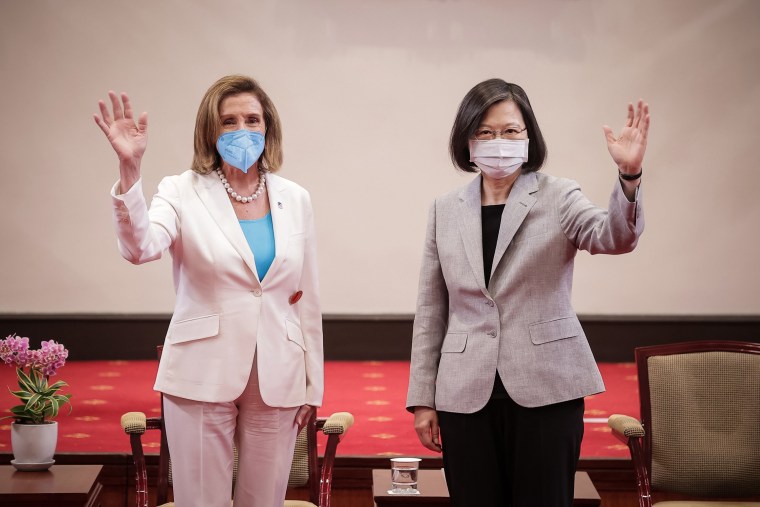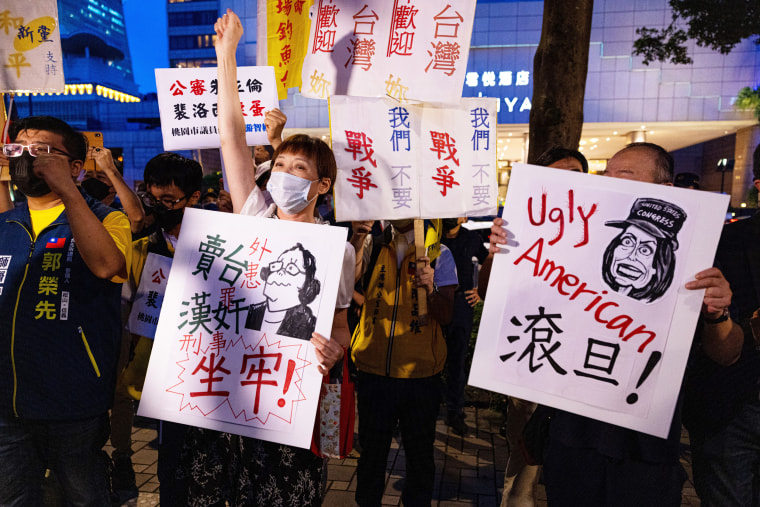TAIPEI, Taiwan — House Speaker Nancy Pelosi made history and drew China's wrath with her visit to Taiwan, which lasted less than a day. But the consequences for the Beijing-claimed island and the broader region could continue long after her departure.
China had warned for weeks against the visit by Pelosi, D-Calif., saying it violated the "one-China policy," under which the U.S. recognizes Beijing as the sole legitimate government of China and has unofficial relations with self-governing Taiwan.
The threats stoked fears of a potential military standoff between the U.S. and China, elevating the political visit to the status of global showpiece. Nearly 3 million people were tracking Pelosi's flight at some point Tuesday to see whether she would land on the island in spite of Beijing's rhetoric, according to the site Flightradar24.
Within minutes of her arrival in Taipei, the Taiwanese capital, China angrily denounced the visit and said it would launch a series of military exercises around the island in response — parts of which will enter Taiwanese waters.
But Beijing is also largely following its usual playbook, experts say, with measures such as summoning the U.S. ambassador and announcing the suspension of some trade with Taiwan.
China's response so far is "most certainly concerning, but not surprising," said Lev Nachman, a political scientist at National Chengchi University in Taipei.
"This does not read as a new or escalated threat beyond what they have done in the past or what we might have expected," Nachman said Wednesday via a messaging app. "That is not to make light of a serious threat, but it is a threat within the realm of what we might have expected."
What's the background?Taiwan was the Pelosi delegation's third stop on a tour of Asia, which also includes Singapore, Malaysia, South Korea and Japan. China viewed her visit to Taiwan as encouraging advocates of independence for the island of 23 million people.
Pelosi, 82, a longtime critic of China's ruling Communist Party, said it was important to support Taiwan, which has come under growing pressure from Beijing in recent years.
"I think she has her own personal motivations," Kharis Templeman, who studies Taiwan politics at the Hoover Institution at Stanford University, said in an interview before Pelosi arrived. "She's close to the end of her career in Congress, [and] this would be a capstone visit on a career in which she has consistently focused on human rights issues abroad."
U.S. lawmakers and other current and former government officials regularly visit Taiwan, but Pelosi was the most senior lawmaker to visit the island since then-House Speaker Newt Gingrich in 1997.
 Nancy Pelosi with Taiwanese President Tsai Ing-wen in Taipei on Wednesday. Getty Images
Nancy Pelosi with Taiwanese President Tsai Ing-wen in Taipei on Wednesday. Getty Images Beijing objected to her visit in part because it "creates a kind of space for leaders of other democratic parliaments and legislatures around the world to visit Taiwan," Templeman said.
While Pelosi's visit was seen as mainly symbolic in value, it sends an important message to U.S. allies in the region, such as Australia and Japan, said Drew Thompson, a fellow at the Lee Kuan Yew School of Public Policy at the National University of Singapore.
"Speaker Pelosi's visit demonstrates to everyone that the U.S. is not intimidated by China's political, military and economic coercion," Thompson, former director of China, Taiwan and Mongolia at the U.S. Department of Defense, said Tuesday.
How is China responding?Pelosi's visit was closely followed in China, where 22 million people watched a livestream tracking her plane on the popular app WeChat. Another popular online platform, Weibo, briefly crashed amid a surge in traffic around the time Pelosi arrived in Taipei on Tuesday night.
Social media was filled with nationalist comments, with some users expressing disappointment that the Chinese military hadn't stopped Pelosi's plane from landing, as some analysts had suggested would happen.
"So what exactly is our country's red line?" a user asked.
But China is acting.
On Thursday, the country's military is set to begin four days of live-fire drills and other exercises surrounding the coast of Taiwan, some of them in one area less than 15 miles away. The state-backed nationalist tabloid Global Times touted the drills as "unprecedented."
 Demonstrators in Taiwan take part in a protest Tuesday against Pelosi's visit to Taipei, Taiwan.Annabelle Chih / Getty Images
Demonstrators in Taiwan take part in a protest Tuesday against Pelosi's visit to Taipei, Taiwan.Annabelle Chih / Getty Images Taiwan also faces economic sanctions from China, its largest trading partner, which said it would stop importing several of the island's fruit and fish products and stop exporting natural sand, an important material in the production of computer chips, a major Taiwanese export.
In a statement Wednesday, the Group of Seven nations of leading economies expressed concern at China's "escalatory response," which they said "risks increasing tensions and destabilizing the region."
That may not be the end of it, said Victor Gao, a vice president of the Center for China and Globalization, a Beijing-based think tank. Pelosi and those traveling with her could also be permanently barred from entering mainland China and its territories, he said, and diplomatic relations might be affected in the long term, as well.
Pelosi's visit "may actually serve to accelerate and speed up China's reunification with Taiwan," he added, saying it had galvanized the Chinese public.
China has never renounced the use of force to bring Taiwan under its control.
That doesn't mean Chinese President Xi Jinping wants to see the situation spiral out of control.
Stability is crucial as Xi prepares to seek an unprecedented third term at a party congress later this year, especially as he contends with serious domestic issues, including an economic slowdown stemming from his "zero-Covid" policies. Billions of dollars in cross-Strait trade and investment are also at stake.
"There's been an awful lot of noise, but the signal is very clear: China is not looking for confrontation," Thompson said, noting that a phone call last week between Xi and President Joe Biden was "quite measured."
What's the feeling in Taiwan?President Tsai Ing-wen, whose government rejects China's sovereignty claim, said she was committed to maintaining peace and stability in the Taiwan Strait but also expressed resolve.
"Facing deliberately heightened military threats, Taiwan will not back down," she said Wednesday in an appearance with Pelosi.
Taiwan's National Defense Ministry reassured residents, who are used to Chinese threats, that it would defend the island's national security while seeking to avoid escalating conflict. It condemned the coming Chinese military exercises as a serious violation of Taiwanese sovereignty that amounted to air and sea blockades.
Pelosi got a warm reception in Taipei, where cheers erupted outside Taipei Songshan Airport as her military plane arrived. Lights on Taipei 101, Taiwan's tallest building, displayed messages of welcome and gratitude for the speaker's visit.
Some Taiwanese TV commentators expressed support for Pelosi's visit but also voiced concern about the consequences for Taiwan after her departure.
Many Taipei residents said Pelosi had every right to visit and welcomed her arrival, seeing it as an opportunity for the world to learn more about Taiwan. Others were more skeptical.
"I think all of this is a conspiracy between politicians," said Xue Fang, 50, a shopkeeper in Taipei, who said Taiwan's future depended on its people's "good fortune."

Post a Comment